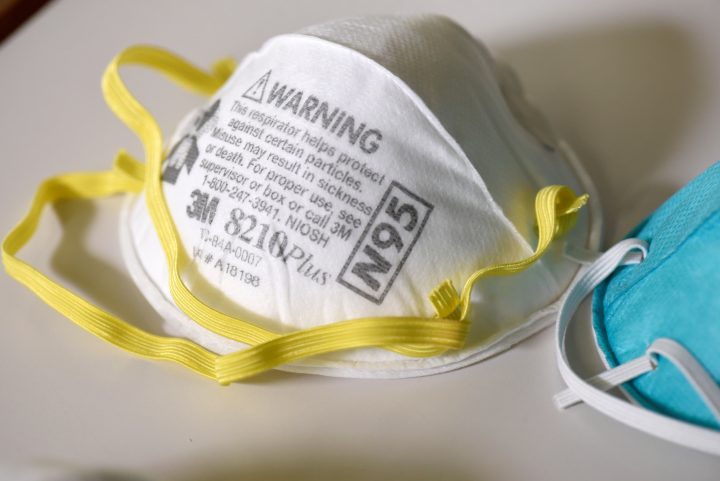Researchers in Winnipeg say they may have found a way for health-care workers to reuse N95 masks up to 10 times while treating patients with COVID-19.

Demand for personal protective equipment — including the all-important N95 masks — has been soaring around the world as overtaxed doctors, nurses and hospitals struggle to manage the spike in COVID-19 cases while protecting themselves from infection.
The work, led by University of Manitoba researcher and critical-care physician, Dr. Anand Kumar, started in mid-March and looked at different ways of sterilizing used masks.
“Medical masks are used by health-care workers, with the N95 providing the best protection against tiny aerosol particles that carry the novel coronavirus,” explained Kumar, in a release.
“Our team wanted to explore how different brands and models of N95s responded to standard hospital sterilization technologies in an attempt to identify safe options for their reuse in the event of supply shortages.
“At the start of the pandemic, it was clear we were going to be facing dramatically heavy demands for the N95s.”
N95 respirators are form-fitting masks designed to seal around the nose and remove 95 per cent of tiny airborne particles. They are typically used by health-care workers and paramedics.
Partnering with Canada’s National Microbiology Laboratory (NML) and the Health Sciences Centre in Winnipeg, researchers tested four different types of N95 masks with four different sterilization methods.
Those methods included repeated cycles of standard autoclaving, ethylene oxide gassing, ionized hydrogen peroxide fogging, and vaporized hydrogen peroxide treatment.
After cleaning, the masks were tested for fit, as well as structural and functional integrity.
According to a release from the U of M, the results show several of the decontamination methods can be used repeatedly without degrading the masks’ effectiveness.
“Our results demonstrate that the assessed decontamination methods were highly effective in sterilizing all four contaminated N95 models mask types,” said Kumar.
“No viable virus was found on any intentionally-contaminated mask following any of the decontamination procedures.”
Kumar said two methods in particular — autoclaving and vaporized hydrogen peroxide — showed no loss of filtering function after multiple cleanings. Kumar said he is particularly excited by autoclaving.
“Unlike the other techniques, it should be available at every established hospital in the world, including in the most poorly resourced countries,” he said of autoclaving, which uses high heat and steam to disinfect and sterilize.
“We successfully decontaminated these pleated, fabric N95 masks up to 10 times using autoclaving.”
Researchers used a non-pathogenic virus in place of the virus that causes COVID-19 for their preliminary testing, but further research has been carried out at the NML using the actual virus and those results are expected in the near future.
The study has yet to undergo peer-review or be published in a medical journal, but the team hopes to eventually share their research findings so that jurisdictions can assess the options that will enable their health-care workers to be appropriately protected.
“Many institutions in highly-affected regions of the world are running out of these masks and others are rationing so that health-care workers must make use of the same masks for long periods which can lead to mask failure and increased risk to the worker,” said Kumar.
Researcher’s full, pre-review paper, can be found on the U of M’s website.

Questions about COVID-19? Here are some things you need to know:
Health officials caution against all international travel. Returning travellers are legally obligated to self-isolate for 14 days, beginning March 26, in case they develop symptoms and to prevent spreading the virus to others. Some provinces and territories have also implemented additional recommendations or enforcement measures to ensure those returning to the area self-isolate.
Symptoms can include fever, cough and difficulty breathing — very similar to a cold or flu. Some people can develop a more severe illness. People most at risk of this include older adults and people with severe chronic medical conditions like heart, lung or kidney disease. If you develop symptoms, contact public health authorities.
To prevent the virus from spreading, experts recommend frequent handwashing and coughing into your sleeve. They also recommend minimizing contact with others, staying home as much as possible and maintaining a distance of two metres from other people if you go out.
For full COVID-19 coverage from Global News, click here.
- Capital gains changes are ‘really fair,’ Freeland says, as doctors cry foul
- Ontario doctors offer solutions to help address shortage of family physicians
- ‘Dangerous message’: Experts slam anti-sunscreen claims circulating online
- ‘Trying not to die’: Tourism operators loaded with debt despite rising demand





Comments